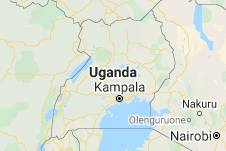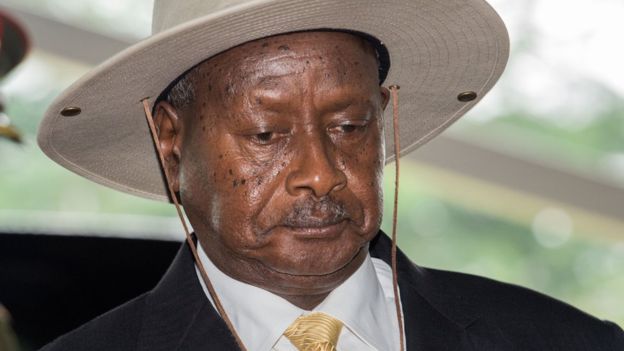
Uganda

Economic Overview
In October 2019, Uganda’s economic structure was significantly changed following a rebasing of the national accounts, resulting into a significant change in the structure of the economy. The revision of the base year from FY09/10 to FY16/17 and inclusion of activities that were previously missing, meant the economy was 21% larger during the last 10 years and by FY18/19, with a share of industry in gross domestic product (GDP) of 30%, much larger than the previous estimate of 20%. This increase was largely driven by manufacturing, for which the share doubled from about 8% to over 16% of GDP. The share of services declined from 58% to 46% of GDP, while agriculture rose from 22% to 24% of GDP.
While about 700,000 young people reach working age every year in Uganda, only 75,000 jobs are created per year. This leaves more than 70% of Ugandans employed in agriculture, mainly on a subsistence basis. An average of one million young people are expected to reach working age between 2030-2040.
Finally, regional instability, pandemic preparedness (Ebola and Coronavirus) and broader global trade uncertainty could undermine exports and affect growth and have implications for debt sustainability and the current account.
Development Challenges
Uganda has achieved remarkable results in reducing poverty over the past decades, mainly driven by the agriculture sector. From 1992 to 2013, the percentage of Ugandan households living in poverty was halved, but vulnerability to external shocks remains high; for every three Ugandans who get out of poverty, two fall back in.
All Uganda’s regions registered an increase in the number of poor persons with the notable exception of the Northern region, which is the poorest, and where poverty decreased from 44% to 33%.

Republic of Uganda
Capital: Kampala
Population: 35.6 million
Area: 241,038 sq km (93,072 sq miles)
Languages: English (official), Swahili (official), Luganda, various Bantu and Nilotic languages
Major religions: Christianity, Islam
Life expectancy: 54 years (men), 55 years (women)
Currency: Ugandan shilling
UN, World Bank

Human Capital in Uganda
Uganda’s Human Capital Index (HCI) is low with a child born in Uganda today only expected to be 38% as productive when she grows up as she could be if she enjoyed complete education and full health. A child in Uganda completes seven years of education by age 18, compared to 8.1 for their regional counterparts. However, actual years of learning are only 4.5, with the 2.5 years considered ‘wasted’ due to poor quality of education. For instance, only 6% percent of children in Uganda can read a paragraph at the end of the fourth grade.
Undernutrition is high and stunting affects one-third of all children in Uganda aged five years and below. At 3%, Uganda’s annual population growth rate is among the highest in the world, despite a reduction in fertility rates. Uganda’s population of 35 million is expected to reach 100 million by 2050, while the annual urban growth rate of 5.2% is among the highest in the world and is expected to grow from 6.4 million (2014) to 22 million by 2040.
Uganda’s refugee population has almost tripled since July 2016 and is currently around 1.35 million, making it the largest refugee host in Africa, and third largest in the world. While its open-door refugee policy is one of the most progressive in the world, and refugees enjoy access to social services, land and can move and work freely, the continued influx is straining host communities and service delivery.
Physical Contacts of the Presidency
Name of Minister:
Address:
Telephone:
Fax:
Physical Contacts of the Prime Minister’s Office
Name of Minister:
Address:
Telephone:
Fax:
Physical Contacts of the National Assembly
Name of Speaker of the House:
Address:
Telephone:
Fax:
Physical Contacts of the Chief Of State and Cabinet Ministers
Name of Minister:
Address:
Telephone:
Fax:
Physical Contacts of the Ministry of Interior
Name of Minister:
Address:
Telephone:
Fax
Physical Contacts of the Ministry of Justice
Name of Minister:
Address:
Telephone:
Fax:
Physical Contacts of the Ministry of Foreign Affairs
Name of Minister:
Address:
Telephone:
Fax:
Physical Contacts of the Ministry of Women’s Affairs
Name of Minister:
Address:
Telephone:
Fax:
Physical Contacts of the National Human Rights Commission
Name of Minister:
Address:
Telephone:
Fax:
Physical Contacts of the Police
Name of Inspector General:
Address:
Telephone:
Fax:
Physical Contacts of the Military
Name of Inspector General:
Address:
Telephone:
Fax:
Important Information of Key Human Rights Issues in Uganda
Number Prisons in Uganda
Number Prisoners in Uganda:
Secret Detention Centres:
Police Stations in Uganda
What are the current and ongoing human rights issues in Uganda?
(1) Freedom of the Press
(2) Human Rights Defenders Issues
(3) Impunity
African Union (AU)
Joined the OAU in
Signed the Constitutive Act of The African Union on:
Ratified:Instrument Deposited:
Signed:
Ratified:
Instrument Deposited:
Signed:
Ratified:
Instrument Deposited:
Signed: –
Ratified: –
Instrument Deposited: –
4.Protocol on Amendments to the Protocol on the Statute of the African Court of Justice and Human Rights
Signed: –
Ratified: –
Instrument Deposited: –
Signed: –
Ratified: –
Instrument Deposited: –
Signed: –
Ratified: –
Instrument Deposited: –
Signed: –
Ratified: –
Instrument Deposited: –
Signed: –
Ratified: –
Instrument Deposited: –
Signed: –
Ratified: –
Instrument Deposited: –
Signed: –
Ratified: –
Instrument Deposited: –
Signed: –
Ratified: –
Instrument Deposited: –
Signed: –
Ratified: –
Instrument Deposited: –
Signed: –
Ratified: –
Instrument Deposited: –
Signed: –
Ratified: –
Instrument Deposited: –